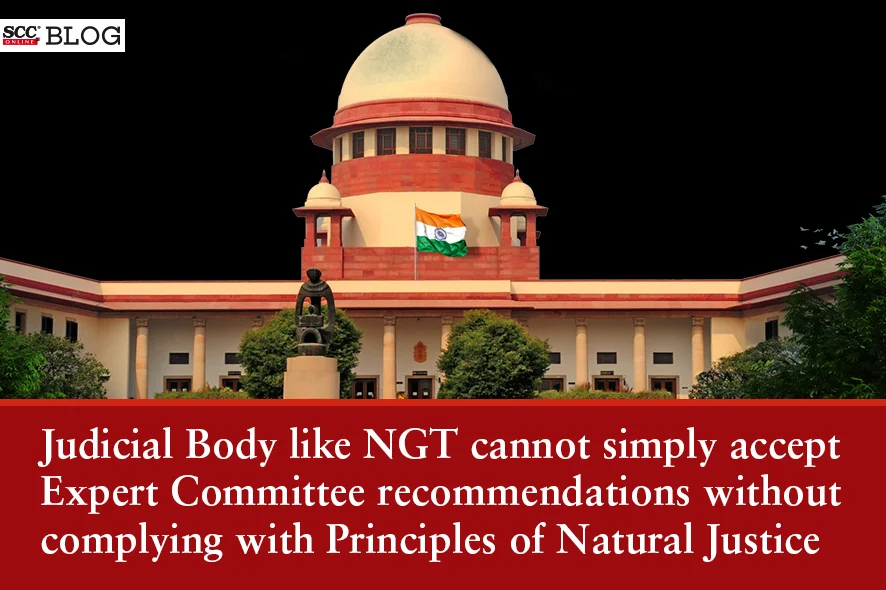Supreme Court: While hearing a batch of civil appeals against the Judgment and order of the National Green Tribunal (‘NGT’), wherein the NGT had directed remedial measures for flying ashes and public health issues in several Thermal Power Plants (‘TPPs’), the Division Bench of B.V. Nagarathna and Prashant Kumar Mishra, JJ., allowed the appeals and set aside the impugned order of the NGT for non-compliance with the principles of natural justice.
Background
In the matter at hand, the appellants were aggrieved by the slew of directions issued by the NGT to TPPs. The directions were issued for problems such as timely installation of air pollution control and monitoring devices, timely utilization and disposal of fly ash, scientific designing of fly ash dykes and safety norms, public health issues. The petitioners were also aggrieved by the way in which the original petition was disposed of. It was the case of the appellants herein, that they were not given an opportunity to file their objections as respondents to the recommendations made by the Committee constituted by the NGT.
Court’s Decision
The Court noted that the directions given by the NGT were in light of the recommendations made by the Expert Committee submitted to the NGT. The Court said that the NGT had simply accepted the recommendations as remedial action suggested by the Expert Committee, but there was absence of objections filed by the appellants herein who were the respondents before the NGT and without giving any opportunity of hearing to them and against whom directions impugned in these cases were passed by the NGT. Therefore, the Court said that the procedure adopted by the NGT was an instance of violation of the principles of natural justice. The Court also referred to Section 19(1) of the NGT Act, 2010, (‘the Act’) which states that, “the Tribunal shall not be bound by the procedure laid down by the Code of Civil Procedure, 1908 but shall be guided by the principles of natural justice.”
Further, the Court observed that the recommendations made by an Expert Committee are not binding on the NGT, they are only by way of assistance to enable the NGT to arrive at a correct decision in the matter. The Court also relied on Sanghar Zuber Ismail v. Ministry of Environment, Forests and Climate Change, 2021 SCC OnLine SC 669, wherein, it was said that “having regard to the nature of its appellate power, the NGT has to apply its mind to the substantive grounds of challenge.”
The Bench said that the NGT is a judicial body and therefore exercises adjudicatory function and the nature of an adjudicatory function would carry with it the requirement that principles of natural justice are complied with, particularly when there is an adversarial system of hearing of the cases before the Tribunal or for that matter before the Courts in India. The Bench also added that the NGT though is a special adjudicatory body constituted by an Act of Parliament, nevertheless, the discharge of its function must be in accordance with law which also included compliance with the principles of natural justice as envisaged in Section 19(1) of the Act.
Referring to the ‘official notice’ doctrine, the Court said that although an authority can rely upon materials familiar to it in its expert capacity without the need to formally introduce them in evidence, nevertheless, the parties in the dispute ought to be informed of materials so noticed and be given an opportunity to explain or rebut them. Also, the data on which an authority is acting must be apprised to the party against whom the data is to be used, to give the party an opportunity not only to refute it but also supplement, explain or give a different perspective to the facts upon which the authority relies. Thus, factual information which comes to the knowledge of NGT on the basis of the report of the Committee constituted by it, if to be relied upon by the NGT, then, the same must be disclosed to the parties for their response and a reasonable opportunity must be afforded to present their observations or comments on such a report to the Tribunal.
Thus, the Court said that applying these principles to the cases that come up before the NGT, if the NGT intends to rely upon an Expert Committee report or any other relevant material that comes to its knowledge, it should disclose in advance to the party so that an opportunity for discussion and rebuttal is given.
The Court found that in the instant case the report of the Expert Committee as well as the recommendations made by the Committee formed the basis for the directions given by the NGT and thus said that such an approach is improper. The Court also added that it was apparent that the appellants herein who were respondents before the NGT were not given an opportunity to file their objections to the recommendations made by the Committee. Therefore, the Court called it a clear case of non-compliance with the principles of natural justice.
Thus, the Court allowed the appeals and set aside the impugned order and remanded the matter to the NGT for re-consideration from the stage of the recommendations filed by the Expert Committee. The appellants were permitted to file their objections. The Court directed the NGT to consider the objections, if any, filed to the recommendations and thereafter dispose of the applications in accordance with law and after giving a reasonable opportunity to all parties.
[Singrauli Super Thermal Power Station v. Ashwani Kumar Dubey, 2023 SCC OnLine SC 824, Decided on 05-07-2023]
Advocates who appeared in this case :
For the Appellants: Advocate Shailesh Madiyal.







